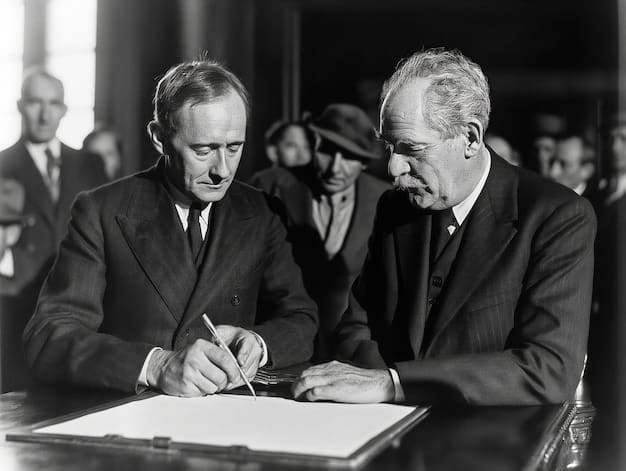The US and the United Nations: A Critical Analysis

The US and the United Nations (UN) have a complex relationship marked by periods of strong cooperation and significant tension, influenced by evolving US foreign policy goals and the UN’s effectiveness in addressing global challenges.
The relationship between the US and the United Nations: A Critical Assessment of the Relationship is a multifaceted topic, often debated among diplomats, academics, and policymakers alike. The United States played a crucial role in the UN’s formation, but its commitment and approach have varied significantly over the decades.
The Historical Context of US and UN Relations
The United States was instrumental in establishing the United Nations in 1945, following the devastation of World War II. The aim was to create a platform for international cooperation and prevent future global conflicts. The vision was ambitious, and the US took on a leading role in shaping the UN’s structure and mission.
The US’s Early Leadership Role
In the early years of the UN, the United States was a strong advocate for its principles. The US provided significant financial and political support, helping the UN to address issues such as post-war reconstruction, peacekeeping, and humanitarian assistance.
Shifting Dynamics During the Cold War
The Cold War brought significant changes to the US-UN relationship. The ideological divide between the US and the Soviet Union often paralyzed the Security Council, limiting the UN’s effectiveness in addressing major global crises. Despite these challenges, the US continued to use the UN as a forum for diplomacy and a tool to advance its foreign policy interests.

Key areas of cooperation during this period included:
- Promoting democracy and human rights around the world.
- Working to contain the spread of communism.
- Addressing global economic challenges.
Despite the tensions of the Cold War, the UN provided a valuable platform for dialogue and negotiation between the US and the Soviet Union, helping to prevent potential escalations and manage conflicts.
In conclusion, the historical context reveals a dynamic relationship influenced by global events and shifting US priorities. The US’s initial commitment to the UN has evolved over time, reflecting the complexities of international relations.
US Financial Contributions to the UN
The financial aspect of the relationship between the US and the UN is a crucial element, often subject to scrutiny and debate. The United States is by far the largest financial contributor to the UN system, providing significant funds to support its various programs and agencies.
Assessed Contributions
Assessed contributions are mandatory payments that member states are required to make based on a formula that takes into account their relative economic capacity. The US is assessed at the highest rate, reflecting its position as the world’s largest economy. Despite these contributions, it’s important to understand that Washington’s contribution fluctuates depending on congressional allocations and foreign policy priorities.
Voluntary Contributions
In addition to assessed contributions, the US provides substantial voluntary contributions to specific UN programs and agencies. These contributions are often directed towards areas that align with US foreign policy objectives, such as humanitarian assistance, global health, and counter-terrorism.

Examples of voluntary contributions include funding for:
- The World Food Programme (WFP).
- The United Nations Children’s Fund (UNICEF).
- The United Nations Development Programme (UNDP).
These contributions reflect the US’s commitment to addressing global challenges and promoting sustainable development.
In conclusion, the financial contributions of the US to the UN are substantial and play a critical role in supporting the organization’s work. However, the level and allocation of these contributions are often influenced by US political and economic considerations.
The US’s Role in the UN Security Council
The United Nations Security Council holds immense power in maintaining international peace and security, and the United States plays a crucial role within this body as one of its five permanent members.
The Veto Power
As a permanent member, the US possesses the power to veto any resolution that comes before the Security Council. This veto power gives the US significant influence over the Council’s decisions and allows it to protect its national interests. The US has historically used its veto power to block resolutions that it perceives as detrimental to its security or foreign policy objectives.
US Influence on Security Council Decisions
Beyond the veto power, the US exerts considerable influence on Security Council decisions through its diplomatic efforts, financial contributions, and political leverage. The US often works closely with other member states to build consensus and garner support for its preferred resolutions.
However, US influence isn’t always guaranteed, because member states often pursue individual agendas. Here are recurring points of tension:
- The Israeli-Palestinian conflict
- Interventions in sovereign states
- Sanctions against specific countries
The UN Security Council remains a critical arena for the US to project its influence and shape international responses to global crises.
In conclusion, the US’s role in the UN Security Council is defined by its veto power and its ability to influence decisions through diplomatic and political means. This role allows the US to protect its interests and shape the UN’s response to global challenges.
Criticisms of the US’s Relationship with the UN
Despite the US’s significant role in the UN, the relationship has faced numerous criticisms from various perspectives. These criticisms often revolve around issues of sovereignty, double standards, and the effectiveness of the UN itself.
Concerns About Sovereignty
Some critics argue that US participation in the UN infringes upon its sovereignty. They believe that international agreements and resolutions can undermine US laws and policies. These concerns have led to calls for the US to limit its involvement in the UN and prioritize its national interests above international obligations.
Allegations of Double Standards
Another common criticism is that the US applies double standards in its approach to the UN. Critics point to instances where the US has bypassed the UN or acted unilaterally when it perceives its interests to be threatened, while simultaneously demanding that other countries adhere to UN resolutions and international law.
Criticisms can also arise from internal shortcomings of the UN, such as:
- Bureaucratic inefficiencies
- Lack of enforcement mechanisms
- Politicization of decision-making
These shortcomings can undermine the UN’s credibility and effectiveness, leading to further criticisms of the US’s relationship with the organization.
In conclusion, the criticisms of the US’s relationship with the UN highlight the complexities and challenges of international cooperation. These criticisms reflect concerns about sovereignty, double standards, and the effectiveness of the UN itself.
The Impact of US Foreign Policy on the UN
The United States, as a global superpower, wields significant influence over the United Nations. US foreign policy decisions often have a profound impact on the UN’s agenda, priorities, and effectiveness.
US Influence on UN Agenda
The US has the power to shape the UN’s agenda by prioritizing certain issues and initiatives. Through its diplomatic efforts and financial contributions, the US can encourage the UN to focus on areas that align with its foreign policy objectives, such as counter-terrorism, human rights, and sustainable development.
US Support for UN Initiatives
US support is often critical for the success of UN initiatives. When the US actively supports a particular program or resolution, it can mobilize other member states to join in and provide resources. Conversely, when the US opposes a particular initiative, it can significantly hinder its progress.
Historically, US foreign policy has affected the UN in these key areas.
- Peacekeeping operations
- Humanitarian aid
- Climate change initiatives
The interplay between US foreign policy and the UN is a complex and dynamic one, with each influencing the other in various ways.
In conclusion, the impact of US foreign policy on the UN is substantial, shaping the organization’s agenda, priorities, and effectiveness. US support is often critical for the success of UN initiatives, while US opposition can significantly hinder their progress.
Future Directions for US and UN Relations
The relationship between the United States and the United Nations is poised for continued evolution, influenced by shifting global dynamics and emerging challenges. As the world becomes increasingly interconnected and complex, the need for international cooperation becomes ever more pressing.
Areas for Enhanced Cooperation
There are several areas where the US and the UN could enhance their cooperation to address pressing global challenges. These include:
- Climate change
- Pandemic preparedness
- Cybersecurity
By working together, the US and the UN can leverage their respective strengths to achieve common goals.
Potential Challenges and Opportunities
Despite the potential for enhanced cooperation, there are also potential challenges that could strain the relationship between the US and the UN. These include:
- Diverging views on key international issues
- Budgetary constraints
- Geopolitical tensions
Addressing these challenges will require careful diplomacy and a commitment to finding common ground.
Looking forward, the US and the UN must adapt to the changing global landscape and find new ways to collaborate effectively. This will require a willingness to engage in constructive dialogue, address mutual concerns, and reaffirm their shared commitment to the principles of the UN Charter.
| Key Point | Brief Description |
|---|---|
| 🇺🇸 Early US Leadership | US played a key role in establishing the UN post-WWII. |
| 💰 Financial Contributions | The US is the largest financial contributor to the UN system. |
| 🛡️ Security Council Veto | The US can veto any resolution in the Security Council. |
| ⚖️ Criticisms & Double Standards | Accusations of double standards and sovereignty concerns persist. |
Frequently Asked Questions
▼
The US played a crucial part, advocating strongly and providing the required political impetus, envisioning lasting international collaboration to preempt future world conflicts.
▼
America provides both assessed contributions, which are mandatory determined by economic capacity, with voluntary contributions aimed towards targeted initiatives and programs aligning with US foreign policy goals.
▼
As a permanent member, the US has the power to veto any resolution, and greatly influences the Security Council’s choices through its diplomatic capabilities and political impact.
▼
Typical objections refer to concerns about sovereignty infringements, the application of inconsistent double standards, along with doubts about the true effectiveness of many UN actions.
▼
America’s foreign policies markedly determine agendas within the United Nations, emphasizing specific objectives and, in fact, setting the pace for many initiatives through financial and political avenues.
Conclusion
The United States and the United Nations have shared a long and complex relationship. While the US played a pivotal role in the UN’s formation and continues to be a major contributor, the relationship has faced considerable criticism and numerous challenges. Ultimately, the future of US and UN relations will depend on the willingness of both parties to engage in constructive dialogue and address mutual concerns. A strong, collaborative partnership is essential for tackling the complex global challenges of the 21st century.





